SPECIAL REPORTS
Morocco’s Earthquake Wasn’t Unexpected – Building Codes Must Plan for Them
Published
8 months agoon
By
Editor
More than 2,000 people died when a powerful magnitude 6.8 earthquake struck Morocco on 8 September. The epicentre was in the High Atlas Mountains, 71km (44 miles) south-west of Marrakesh. Moina Spooner, from The Conversation Africa, asked José A. Peláez, a professor in geophysics who has carried out research on seismic activity in Morocco, about what led to this situation.
What geological factors contributed to this earthquake?
The Earth’s surface is constituted of several tectonic plates, large segments of the planet’s outer layer, which move against each other. This movement is responsible for various geological phenomena, such as earthquakes, volcanoes, and the formation of mountains and ocean basins.
The tectonic activity in Morocco primarily involves the convergence of the Eurasian and the Nubian (African) plates. The Eurasian Plate pushing against the Nubian Plate is what led to the formation of the Atlas Mountains, which run through Morocco, Algeria and Tunisia. The mountains are where the epicentre of this recent earthquake was.
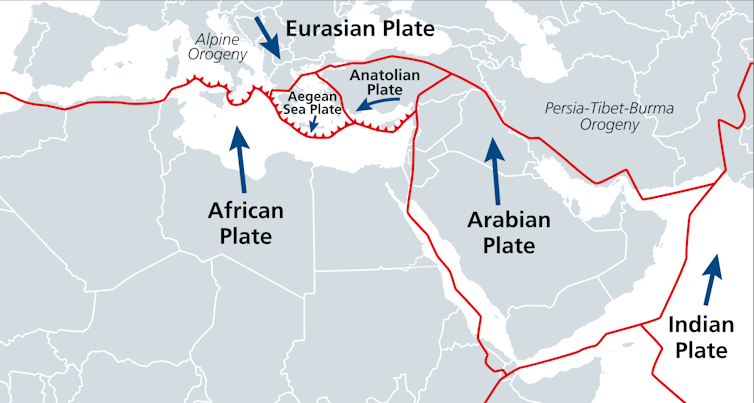
Currently, the collisions between the plates are causing a shortening of the Atlas Mountains, explaining the area’s seismicity. We know this because of data from GPS measurements, which show that they are moving about 1 millimetre closer to each other every year. This shortening and compression is causing what are known as faults, huge friction between plates. These faults are the likely cause of this earthquake. Scientists think that these faults have been active for a long time, going back a few million years.
In addition, as pointed out by various researchers, the High Atlas Mountains have a unique geological feature where the Earth’s outermost and hard layer, called the lithosphere, is thinner than usual, combined with an unusual rise of the mantle. All these features could have influenced the occurrence of this high magnitude earthquake.
What is Morocco’s history of earthquakes?
Seismic activity and its phenomena, like earthquakes, are not unusual in Morocco. Over the last thousand years, earthquakes affecting Morocco have tended to take place mainly in two areas. Offshore, along the Azores-Gibraltar transform fault and the Alboran Sea, and another one onshore, along the Rif mountains in northern Morocco and the Tell Atlas mountain range in north-western Algeria. Earthquakes along the Atlas Belt are smaller in number, but not unusual.
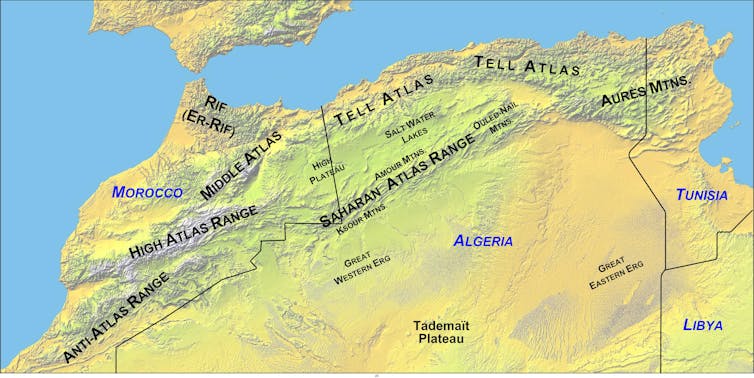
The most significant, recent earthquakes affecting Morocco were in 1994, 2004 and 2016, with magnitudes ranging between 6.0 and 6.3. These occurred in the most seismically active region in Morocco and also in the western Mediterranean region. A bit further back in history, there was the devastating Agadir earthquake in February 1960, with a magnitude of 6.3. It was located around the boundary between the western High Atlas and the Anti Atlas, to the south. Available data indicates that between 12,000 and 15,000 people died due to this event. In addition, near the location of the recent event, there was another earthquake in 1955, with an estimated magnitude of about 5.8. Even further back, prior to the establishment of seismometers, several significant events were recorded in Morocco. Among them were the 1624 Fès earthquake, with an estimated magnitude of 6.7, and the 1731 Agadir earthquake, with a magnitude of 6.4.
Could it have been predicted?
Earthquakes cannot be predicted, even with the current knowledge in seismology. In fact, many researchers think that it will not be possible to do so in the future either. What seismologists can do is establish the areas in which earthquakes are most likely to occur, even establish the probability of their occurrence and its uncertainty.
This is that we call a long-term prediction, carried out from specific seismic hazard studies in the region. They are based on knowledge of past seismicity in the area, both historical and instrumental, and on the existence and knowledge of active tectonic structures (faults) that could generate earthquakes. The greater the knowledge that one has on these two topics – seismicity and active faults in the region – the more knowledge one will have about the future seismicity that may occur in the area, and the less the uncertainty will be. Seismic hazard studies also include the study of near-surface soil conditions and the characteristics of buildings. This helps to assess the possible damage from these potential earthquakes.
What can be done to lessen the impact of future earthquakes in Morocco?
The best tool we have to mitigate the impact of earthquakes is to conduct reliable seismic hazard studies. The results of these must then be implemented into national building codes. This way engineers can incorporate seismic safety into building designs.
Building codes need to take into account several factors, including the characteristics of the soil, the way seismic waves move and how the soil can amplify its movement during an earthquake. Also the expected shaking of the ground, which influences the behaviour and damage of buildings. These factors vary from one city to another, and in some cases from one district to another.
Seismologists know that earthquakes do not kill people – buildings do. Buildings with lack of regulation and lack of structural support are potential killers in high seismic hazard areas. Building codes must therefore be mandatory, and should be updated periodically. As more is learned about earthquake geology and the impact of earthquakes on buildings, building codes should be updated regularly. This is the best way to protect ourselves against these catastrophic phenomena. Territorial planners and rulers must know this and take it into account.
Article originally published in the Conversation
You may like
-
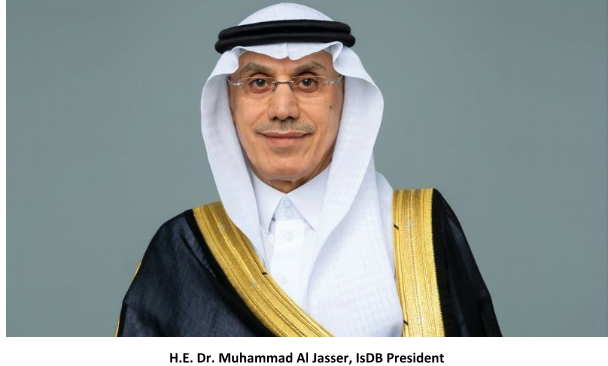

IsDB President Advocates for Cultivating Entrepreneurial Leaders
-
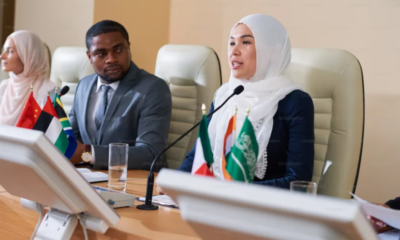

Sanctity of Hijab Being Undermined by the Liberal Media Globally
-
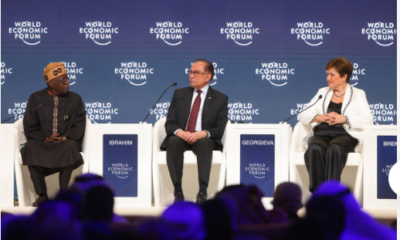

Davos Really Comes to the Desert as the WEF Arrives in Riyadh
-
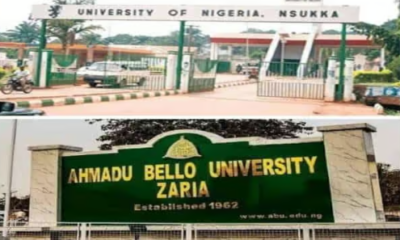

To Nigerian Universities, a Message from America’s Campuses
-
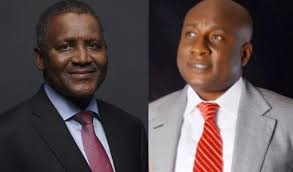

Dangote, Air Peace and the Patriotism of Capital
-


How Islamic Social Finance Contributes to Poverty Alleviation
SPECIAL REPORTS
To Nigerian Universities, a Message from America’s Campuses
Published
2 days agoon
April 30, 2024By
Editor
By Chidi Amuta
On many fronts, America is showcasing the many burdens and benefits of democracy. Most Washington politicians are united in their support for Israel. But out on the streets, many Americans are opposed to Israel’s raging genocidal onslaught on Gaza and other Palestinian enclaves. While Congress had little trouble approving a further $20 billion in military aid to Israel, there is anger on the streets and mostly on university campuses. Opposition to the naked aggression against Palestinians has united the American streets and campuses against political Washington. A gale of anti-Semitic protests has recently endangered lives and interests associated with Israel. This has now been followed by a whirlwind of campus protests all over America and even beyond.
In American courts, Donald Trump has kept the judiciary busy with legal arguments which now sound more like staged one-man campaign talk shows. The court appearances for Trump’s multitude of criminal and civil transgressions have become opportunities for a rehash of his boring campaign messaging. In a sense, Trump and his advisers are testing the legal limits of liberal democracy. It is all about trying to justify the right of an authoritarian demagogue to impose his private ambition on America’s long established democratic institutions and traditions. Simply put, a political deviant and serial transgressor wants to return as president. Twice impeached, severally accused of infractions ranging from campaign fund malfeasance to dubious business records and dodgy book keeping, Mr. Trump insists on his entitlement to the throne. Whichever way the legal outcomes go, a lot of issues in American democracy are likely to come under severe test with each verdict in Trump’s litany of court cases.
By far the more concerning issue in the United States now is the series of pro-Palestinian protests and demonstrations now sweeping through the campuses of American universities. These are not just ordinary universities. They are mostly Ivy League universities. From Colombia to Yale, from Harvard to New York University, UCLA, University of Southern California to University of Pennsylvania, and Emory University, large groups of students of diverse nationalities have trooped out daily to protest against Israel’s violation of the rights of the Palestinian people in its prolonged war on Gaza and other Palestinian enclaves.
So far, the protests have disrupted normal academic and other activities on the various campuses. The police has made numerous arrests of the protesters in a bid to restore normalcy. Some of the universities have opted for closure and discontinuation of academic activities to avoid the protests degenerating into violent encounters and disruptions.
The pro-Palestinian protests have multiple implications for America’s democratic culture. The right to freedom of association and expression remains inviolable. But the responsibility of the political leadership to pursue foreign and domestic policies in line with the national interest are sacrosanct. The students have a right to protest actions and policies of government that run counter to their convictions. Normal civility demands that such protests should not be violent or infringe on the rights of those who do not share these convictions to go about their business.
In the affected campuses, however, the groundswell of these protests have been so huge that no normal academic and social activities can proceed on these campuses. While police and law enforcement have a responsibility to maintain law and order and protect the rights of students who may not share the beliefs and convictions of the protesters or want to join the protests, the scope and spread of the protests indicate a clear political line on the part of the student population. While no one expects the protesters to have carry the day, it is also true that no responsible political establishment can ride rough shod on the feelings of such a large body of protesters.
Throughout American history, the university campuses have served as theatres for the expression of political views and beliefs that often run counter to the political temper of Washington. On the Vietnam war, on Civil rights, on Black Lives Matter, on police brutality and systemic racism and variety of other sensitive public issues, the University campuses in the United states have consistently indicated an independent line of thinking that often runs counter to the main current of official Washington. Through these protests and demonstrations, the university campuses have been able, over time , to pressure politicians in Washington to at least listen to contrary views. At critical moments, such protests have succeeded in getting the government to reconsider aspects of foreign and domestic policy.
Already, some key politicians from Washington have visited a number of protesting campuses to appeal for calm and press home their perspective. The students have however stood their grounds just as the pro-Israeli politicians have pressed their arguments. It is not likely that any argument will be strong enough to justify the long standing oppression of the Palestinians especially the blockage of their right to a free and independent homeland.
The present scene on America’s university campuses is reminiscent of happier days on Nigeria’s university campuses. There was a time from the immediate post independence days to the days of military rule when Nigerian university campuses served as the catalyst of social and political ideas for national unity and progress. For instance, It was Nigerian students at the University of Ibadan who staged massive protests to compel the newly independent Nigerian government against signing a defense pact with the departing British colonial government.
In the days of military dictatorship, Nigerian university students served as the remaining voice of democratic instincts. Students campaigned for the rights of common people, against authoritarian impositions and the habitual arbitrariness of military rule. Students protested against frequent petroleum price increases, against unlawful detentions of opposition figures. When in 1978 General Obasanjo’s education minister, Colonel Ahmadu Ali, tried to increase university tuition frees, in Nigerian universities, students rose in unison during the “Ali Must Go” demonstrations and pressed for his removal from office.
From the 1960s to early 1990s, the Nigerian university campus remained a litmus ground for testing public policies. Political and military leaders sought a certain degree of acceptability among university students and their lecturers. Understandably the Nigerian university campus also became the hotbed of radical ideas. During the ideological polarization of the Cold War era, our universities became a friendly terrain for radical progressive anti bourgeois ideas. This led to an understandable radicalization of student union politics and even the politics of organized unionism among academics. The National Association of Nigerian Students (NANS) became an arrowhead of radical student unionism. These were the origins of ASUU’s aggressive trade unionism which has largely survived to recent times.
There was consequently a certain unanimity of perspectives on national issues among students in campuses all over the country. From Ife to Nsukka, from University of Ibadan to Ahmadu Bello University, from Port Harcourt to Calabar and Ilorin, Nigerian students and academics were united in their perspectives on military rule, corruption, and the plight of the poor and the commonality of poverty among underprivileged Nigerians.
As undergraduates then, we shared a common ideal of a better nation. We trooped out to protest unkind policies. We faced police truncheons and tear gas and even military jackboots and live bullets. We did not habour these silly divisions along ethnicity, religion and region. We did not despise the poor but fought for the smashing of the chains of poverty. We thought our youth and idealism was enough to transform the country into a happy place for all. For us then, the Nigerian revolution was an achievable and imminent possibility. Our idealism contrasted with whatever ideas were fueling the policies of politicians and military leaders in Lagos and later Abuja. We held strong views on contemporary issues and most times embraced alternative truths to those of governments of the day.
We took a stand on most domestic and foreign policy issues that were burning central at different times. We took a stand on Southern Africa; on independence for Zimbabwe, Namibia and Angola. We vehemently stood shoulder to shoulder with the Murtala and Obasanjo governments on Apartheid. We stood with the world on the Palestinian struggle and the heroic stance of the then Palestinian Liberation Organization (PLO) of Yasser Arafat.
Key politicians understood the crucial place of the campus as a vital platform for the galvanization and aggregation of ideas for national development. Key politicians therefore often chose to deliver the annual Convocation lectures of the various key universities as a way of generating novel ideas for the development of the nation. Such strategic lectures also served as means of bridging the distance between town and gown and as praxis in the struggle for a better society.
It would be recalled that at the height of the debate of how best to accommodate the military in future power arrangements, Nigeria’s first President Dr. Nnamdi Azikiwe used the opportunity of the convocation lecture at the University of Nigeria, Nsukka, to advocate the theory of Diarchy as a power sharing arrangement between civilian politicians and military leaders. Similarly, Chief Obafemi Awolowo used one of the convocation lectures at Ife to question the efficacy of fruitless probes of past governments as an anti corruption tool. Those were the glorious days of the Nigerian university campus. Then they were universities. There were scholars, patriotic students and as Achebe lamented, there was once a nation.
In today’s Nigeria, the campus is virtually dead either as a centre of national consciousness or an incubator of new ideas. The universities have died as cultural laboratories or as the breeding ground of a responsible national elite. The Nigerian university campus has died as a center of serious positive thinking or purposive national action for progress. In place of fiery nationalism and idealism, we now have a student unionism that apes and imitates the decadent culture of our nasty politics.
Contest for NANS leadership has become a sad replica of the politics of ‘stomach infrastructure’ and money bazaars. When elected into office, the leadership of our students unions want to drive huge SUVs like Abuja politicians. They appoint innumerable personal aides with nomenclatures borrowed from our wasteful national political culture and idiom. The broad mass of our students are now united by cultism, cyber crimes, bloody rituals and killer squads in a hunt for human body parts for ritual.
Our student population has degenerated into conclaves of cults, cyber crimes and a descent into the dark precincts of occultism, witchcraft and ritual. Places established to pursue enlightenment and modernism have now become covens of modern day witches and ritual murderers. At other times, the only language that flies around our campuses is that of quick mega cash fuelled by the hunger for designer clothing, outrageous automobiles and luxury mansions. Every undergraduate aspires to become an internet ‘influencer’, stage musician, and naked model or narcotics courier irrespective of the courses they are registered to study.
Among the academics themselves, we now have serial racketeering for contracts, a thriving trade of blackmail of ‘sex for marks’. Professors are now standing trial for openly blackmailing their female students into sexual rumps sometimes in open offices. The deployment of juju and cultism for promotions and appointments have replaced the previous dedication to merit, national good and the pursuit of academic excellence.
As America’s university campuses continue to witness a wave of protests of universal moral condemnation of America’s support for Israel’s systematic genocide in Palestine, we need to look again at what has killed the Nigerian university. Three ugly forces have invaded our university campuses: dark money, bad politics and godless religion. To rescue our universities and redirect them back to being factors of national unity, progress and progressive development, we require a political leadership with the will to chase away and neutralize this trinity of negativity.
Dr. Amuta, a Nigerian journalist, intellectual and literary critic, was previously a senior lecturer in literature and communications at the universities of Ife and Port Harcourt.
SPECIAL REPORTS
Forget State Police; Perhaps a National Guard Instead
Published
2 months agoon
March 18, 2024By
Editor
By Dr Chidi Amuta
Nigeria’s now perennial insecurity has been damaged by political laziness. Every two- penny politician has developed a habit of weaponizing insecurity as political language. In the process, very little effort or rigour is devoted to the reality of what we are dealing with. Even those who are paid to keep us safe tend to resort to simplistic solutions to what is clearly a complex problem. Everyone seems to be mimicking politicians, talking frequently about insecurity as if the problem will go away the more we talk about it.
National insecurity as we have come to know it has grown in dimension and scope over the last twelve years or so. When factions of jihadist terrorists invade local governments in parts of Borno or Yobe state, we are dealing with threats to Nigeria’s sovereignty by an adversary that may indeed be ‘external’ with inputs from ignorant local zealots. They take and hold territory, convert citizens into dissidents and collect taxes and levies and in the process extract loyalties that ordinarily belong to a sovereign authority. This level of national insecurity belongs in the realm of external aggression by a concerted foreign adversary. It does not matter whether it recruits and arms our citizens to do its bidding or draws inspiration from an external multinational ideology such as fanatical Islamist fundamentalism. We must call it its real name and design and deploy containment instruments and strategies that befit an external aggression.
With the onset of the Boko Haram insurgency in parts of the North East, Nigeria can be said to have been involved in a counter insurgency war for the better part of the past twelve years. In the process, Boko Haram has sometimes been degraded, reinforced, splintered or been acquired by ISWAP and other franchises born and bred in the Middle East and nurtured in the turbulent Sahel. Have we been winning or losing that war? Yes and no. We have at least retaken most of the local governments that the terrorists initially acquired as part of an evil caliphate in the hot days of Al Qaida and ISIS. But the fact that twelve years after the inauguration of Boko Haram, factions of this movement are still taking huge numbers of hostages and razing buildings is an indictment of whatever effort we have exerted so far.
In the immediate neighboring precincts of the insurgency war- Katsina, Kaduna, Zamfara- hybrid forms of insurgent insecurity have taken shape. Banditry, quantum abductions and kidnapping for ransom are now recognized forms of national insecurity. Initially, these hybrid forms acted as retail arms of the larger jihadist insurgency. They used to supply them with hostages, sha ransoms and collected revenue and hide under their ideological umbrella for greater political relevance. Over time, however, the bandits and other downstream criminal gangs have come unto their own. They mostly now operate as independent criminal enterprises with a purely commercial purpose. This form of insecurity has graduated into a criminal enterprise. They carry out daring raids, collect huge ransoms which is reinvested in more arms for further raids. The industry grows.
In this form, agents of insecurity have sometimes reached for recognition by state governments and agencies of national security. Some local bandit squads have in the recent past reached understandings with individual state governments and even posed for photo opportunities with them after these meetings. Implicit in such unholy alliances is a certain illicit power sharing arrangement. Under these arrangements, embattled state governments are known to have ceded parts of their territory to bandit squads, allowing them to collect revenue from locals and to wield authority over some local governments literally unchallenged.
This form of national insecurity is inherently dangerous because it cedes parts of the national sovereign space and authority to non -state actors and in the process accords them space and scope to disturb the peace, make lots of money and whittle down the capacity of security agencies to exercise total control over the national sovereign space. More dangerously, illicit non -state actors partake of national resources to make the nation even more ungovernable while also compromising segments and aspects of national security structures and personnel.
The atmosphere of insecurity created by the proliferation and free reign of bandit squads and roving armed cartels has led to a spread in the supply of small to medium scale arms. Retail editions of trouble makers like armed robbers, small time kidnappers and urban cults have found an atmosphere of general insecurity that is both lucrative and in vogue. An industry of sorts has been born. Herdsmen that were originally engaged in herding and the livestock trade have since found kidnapping, armed robbery and abductions more lucrative than escorting scraggy herds around the nation.
We cannot fail to add to this picture the thriving political industry and its inherent criminal offshoots. Political thugs, licensed state militias and all manner of private armies have in the last twenty four years of democracy come into being. Political supremacy in most parts of the country has come with the help of armed thugs generously supplied with weapons, narcotics and other dangerous substances. In post election periods, these political agents of violence tend to find work for their hands anduse for their weapons in sundry criminal undertakings. In an atmosphere where employment is scarce and easy money quickly runs dry, the political industry has perhaps inadvertently been fueling the atmosphere of national insecurity which the same politicians return to convert into campaign issues in the next election cycle.
The fierce competition for political vantage placement has also led to the growth of ethnic, regional and other separatist movements. They generally start out by shouting for recognition and relevance in a national space that deliberately ignores extant disquiet. When no one seems to be listening, the rhetoric of separatist agitators assumes an incendiary tone. Soon enough, the more determined ones set up armed militias since the authorities tend to listen more when their monopoly of violence is challenged by an equally fierce contender for power and political space. Armed separatist movements have in the last ten years therefore added their voice and muscle to the spread of violence as a means of political expression in the country. IPOB, ESN and the various Niger Delta militias belong in this sphere.
This is the effective backdrop to the current situation in which governments at nearly every level seem to have been held to ransom by all these forms of insecurity all over the country. The sheer expanse of the insecurity landscape is more vast than the entire security asset base of the country can deal with. Therefore, bandits and all sorts of criminals are fairly certain that the security agencies cannot easily interrupt their operations let alone effectively trail or arrest them.
There is no lack of response from government. Endless meetings have taken place between politicians and service chiefs. The two chambers of the National Assembly have met severally with the service chief. State governors have met repeatedly with the president with the matter of insecurity topping the agenda of every meeting. The Federal government has gone to considerable length to acquire weapons of war from all corners of the globe to combat what has become a systemic insecurity. It has become systemic because it has become self- regenerating, having become an economic sub sector which requires self sustainability to drive itself as a series of economic activities.
Last month, however, an emergency meeting of the president and state governors was prompted by an increase in incidents of insecurity in and around the Federal Capital Territory of Abuja. The most consequential decision of that meeting was a decision to begin the implementation of the long canvassed introduction of State Police as a silver bullet to end insecurity in the country.
One of the strongest arguments advanced by advocates of a State Police system is local knowledge and proximity to the community origins of criminality around the country. This argument is not new. Nor are we just being introduced to perspectives about how to solve insecurity in the country.
Given the picture of the multi dimensional nature of our insecurity, no single item agenda can deal with the problem. State Police is fraught with many weaknesses. It is likely to be commandeered by ambitious state governors into private political weapons. The operatives could become terror squads who use their new found power and uniforms to torment innocent people. State Police can further divide the country, terrorize the people they are supposed to protect and reduce the effectiveness of the existing national police force. Misuse of the powers of the State Police can further divide the country. After all, before the civil war, we had regional police formations. They became part of the divisive forces that had to be neutralized to reunify the country in 1970.
It is undeniable that one of the benefits of over four decades of military rule and the civil war is the emergence of a unified police and military command. That benefit cannot be wiped away by the present anxiety over insecurity. Nothing has so far happened in our national security situation that invalidates or overrides the advantages of national integration in matters of police or military command and national security control. On the contrary, what our situation requires is a serious interrogation of the overall internal security situation in the country to determine why the existing structure has not quite served us well enough.
We are under policed. The police has been overwhelmed for years in terms of personnel and equipment. Equipment and recruitment in the police has not matched our population growth and the rate of sophistication of the criminal enterprise. Similarly, the military has in the post civil war era found itself in roles that have degraded its operational capability and professional advancement. The involvement of the military and entire gamut of national security apparatus in internal security has militated against real professional development of the various services. Our military is today involved in civil security operations in all of our 36 states and Abuja.
As indicated earlier, the profile of our internal security challenges presents a complex picture that may not have fully dawned on the present state. At the end of the civil war, the enemy was either an external aggressor or internal criminals. The civil populace wanted to be at peace after the trauma of war. While a war -tested military was adequate for the former role, the police was more than adequate for the latter task of keeping the peace. The military is defined in its role. Its rules of engagement are self -defining: defend or be conquered. The police is a civil force with rules of engagement circumscribed by democracy and the civil rights of free citizens.
Towards the end of the Babangida regime, a different internal security picture began to emerge. A different type of civil unrest became more manifest. Inter communal violence began to feature among groups that had coexisted for years. Between the Jukun and their neighbours, in the Zango Kataf area of Southern Kaduna, in parts of the Niger Delta etc. Sections of the country began to witness problems of ethno national integration. Even within the newly created states, issues of inter communal co -existence began to show up. There was a perception then than the task of nation building was largely uncompleted and still needed to be fine -tuned. A different type of trouble maker was emerging. Armed militants intent on challenging the federal might were in the horizon.
The new forms of violent self -assertion were more than the police could deal with but a little less ferocious than what a full military engagement was required to deal with. The necessity was therefore for an intermediate force; something not as tame and civil as the police and also not as ferocious and terminal as the military. Thus was born the idea of the National Guard. Unfortunately, this idea came too late in Babangida’s troubled political transition programme. Opposition to the possibility of a Babangida self- perpetuation ploy also became part of the opposition to the idea of a National Guard. For the political class, no good or disinterested idea could come from the beleaguered military administration. Both were thrown away with the same birth water.
Here we are once again with an insecurity challenge that literally re-writes the challenge that was envisioned by the authors of the National Guard over 30 years ago. The idea of the National Guard was to have a uniform national organization but with substantial state government control on deployment. It should be a mid intensity force that is civil enough to realize that the criminals and trouble makers in each state are first and foremost Nigerians with full civic rights. It however needs to be taken more seriously than the police at the local government office who separates domestic fights and settles quarrels among siblings.
The National Guard should be under the ultimate control of the president as commander in chief without whose endorsement no state governor has the power to deploy the National Guard. But the National Guard needs to be composed of state contingents who are familiar with the local terrain.
In the United States, the National Guard is an offshoot of the army. It is made up of army reservists who are called up for specific tours of duty for specific lengths of time annually. In times of national emergency above the call of the police but less intense than requiring the military, the army can advise the president to call in the National Guard. The desirable Nigerian National Guard should be a variant of this format.
On no account must we establish and equip a separate state police force and place it under the control of our emergent crop of imperial governors. That would be an invitation to quick anarchy.
Dr. Amuta, a Nigerian journalist, intellectual and literary critic, was previously a senior lecturer in literature and communications at the universities of Ife and Port Harcourt.
SPECIAL REPORTS
Dr. Gazali Muhammad Appointed Technical Advisor to President Bola Ahmed Tinubu of Nigeria on Development Finance
Published
3 months agoon
February 13, 2024By
Editor
From our special correspondent in Abuja
In a significant move towards fortifying Nigeria’s economic strategies, Dr. Gazali Muhammad Abubakar has been appointed as the Technical Advisor to President Ahmad Tinubu of Nigeria on Development Finance. This announcement comes on the heels of his impactful tenure as the Executive Secretary/CEO of the National Agricultural Development Fund.
Dr. Muhammad, an alumnus of Bayero University, Kano (BUK), where he earned a B.Sc. in Economics, the Enugu State University of Science and Technology, where he bagged an M.Sc in Economics with distinction, further solidified his academic prowess with a Ph.D. in Economics from the University of Bakhtalruda, Sudan. Notably, his interest in Islamic finance, coupled with a diverse array of professional qualifications, positions him as a thought leader in the realm of economic development.
Prior to this prestigious appointment, Dr. Gazali has held pivotal roles, including the position of Senior Special Advisor to the Managing Director of NIRSAL Micro Finance Bank. This experience reflects his commitment to navigating the intricate landscape of financial institutions, underscoring his ability to contribute significantly to the nation’s economic vision.
The expectations surrounding Dr. Gazali’s new role are nothing short of transformative for comprehensive national development. With a background steeped in agricultural development, he is anticipated to spearhead policies and initiatives that bolster national development, particularly focusing on sustainable growth strategies.
Dr. Gazali’s expertise in Islamic finance is expected to bring a fresh perspective to economic policies, potentially fostering financial inclusivity and ethical financial practices as integral components of Nigeria’s developmental agenda. No doubt, his strategic guidance is anticipated to extend beyond conventional economic measures, reaching grassroots levels and ensuring that development is inclusive and impactful across various sectors.
With this appointment Dr Gazali emerges as a key player in shaping Nigeria’s economic landscape, and its impact is poised to extend beyond the corridors of power and the urban centers of Nigeria, reaching the grassroots level and becoming a driving force for national development. Through his strategic guidance, Nigeria looks forward to a renewed emphasis on financial inclusivity, creating opportunities for a broader spectrum of the population to actively participate in economic activities.
Furthermore, the fight against poverty in Nigeria is set to receive a boost under Dr. Gazali’s leadership. His comprehensive approach, honed through diverse experiences in the financial sector, is expected to drive initiatives that uplift marginalized communities and create sustainable solutions to alleviate poverty.
As Nigeria charts its course towards economic resilience and inclusivity, Dr. Gazali’s appointment signals a strategic move by the Federal Government of Nigeria to harness the expertise needed for comprehensive and impactful economic development. His tenure as Technical Advisor is anticipated to leave an indelible mark on Nigeria’s pursuit of sustained growth, financial inclusivity, and poverty alleviation.

Nigeria is Pioneering a New Vaccine to Fight Meningitis – Why this Matters

Sudan’s Civil War is Rooted in its Historical Favouritism of Arab and Islamic identity
IsDB President Advocates for Cultivating Entrepreneurial Leaders
Topics
- AGRIBUSINESS & AGRICULTURE
- BUSINESS & ECONOMY
- DIGITAL ECONOMY & TECHNOLOGY
- EDITORIAL
- ENERGY
- EVENTS & ANNOUNCEMENTS
- HALAL ECONOMY
- HEALTH & EDUCATION
- IN CASE YOU MISSED IT
- INTERNATIONAL POLITICS
- ISLAMIC FINANCE & CAPITAL MARKETS
- KNOWLEDGE CENTRE, CULTURE & INTERVIEWS
- OBITUARY
- OPINION
- PROFILE
- PUBLICATIONS
- SPECIAL FEATURES/ECONOMIC FOOTPRINTS
- SPECIAL REPORTS
- SUSTAINABILITY & CLIMATE CHANGE
- THIS WEEK'S TOP STORIES
- TRENDING
- UNCATEGORIZED
- UNITED NATIONS SDGS
Trending
-

 TRENDING11 months ago
TRENDING11 months agoAFRIEF Congratulates New Zamfara State Governor
-

 PROFILE9 months ago
PROFILE9 months agoA Salutary Tribute to General Ibrahim Badamasi Babangida: Architect of Islamic Finance in Nigeria
-

 BUSINESS & ECONOMY3 years ago
BUSINESS & ECONOMY3 years agoThe Climate Crisis is Now ‘Code Red’: We Can’t Afford to Wait Any Longer
-

 BUSINESS & ECONOMY3 years ago
BUSINESS & ECONOMY3 years agoClimate Policy In Indonesia: An Unending Progress For The Future Generation
-

 BUSINESS & ECONOMY3 years ago
BUSINESS & ECONOMY3 years agoIPCC report: ‘Code red’ for human driven global heating
-

 HALAL ECONOMY10 months ago
HALAL ECONOMY10 months agoRevolutionizing Halal Education Through Technology
-

 BUSINESS & ECONOMY3 years ago
BUSINESS & ECONOMY3 years agoThe Black sea protection initiative: What should we remember?
-

 BUSINESS & ECONOMY2 years ago
BUSINESS & ECONOMY2 years agoDistributed Infrastructure: A Solution to Africa’s Urbanization

